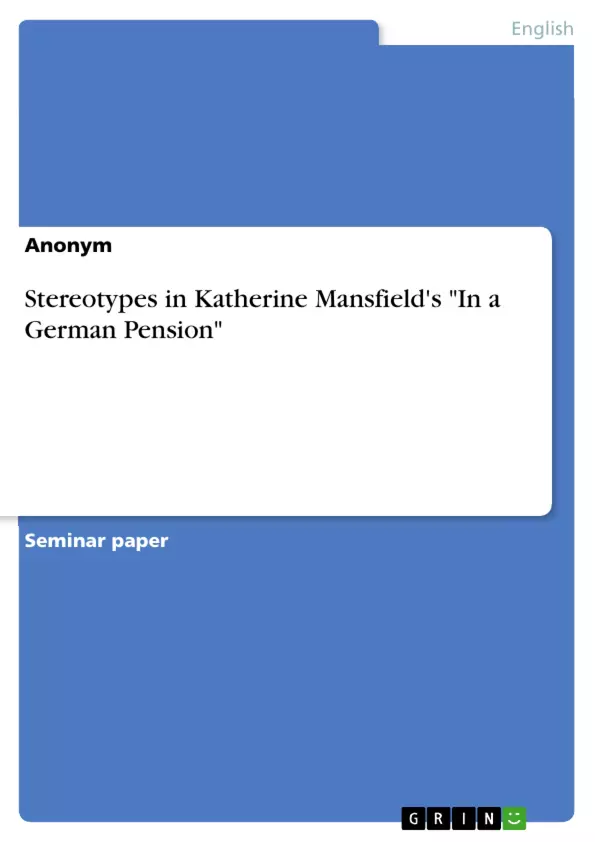This research paper is concerned with the image of stereotypes in selected short stories of Katherine Mansfield. Especially the German stereotype in In a German Pension will be analyzed.
"In a German Pension" is Mansfield's first published work of fiction (published in 1911) and takes place in a enviroment that Mansfield has visited herself. She does not value most of the stereotypes she imputes to her characters, but because of her special way of carrying it to the extremes, she manages to convey her views about German stereotypes to the reader. These views will be analyzed later on. By repeating these stereotypes in the different short stories in this collection, they become especially apparent and shift into the centre of the discussion.
Even if Mansfield herself feels ashamed of her work, which she has written in her younger years, it is definitely an important piece of literature, speaking of German stereotypes.
Inhaltsverzeichnis (Table of Contents)
- Introduction
- Analyzing her Short Stories
- "Germans at Meat"
- "The Swing of the Pendulum"
- "The-Child-Who-Was-Tired"
- "At Lehmann's"
- "The Sister of the Baroness"
- “Frau Fischer”
- The Modern Soul
- "Frau Brechenmacher attends a Wedding"
- Conclusion
Zielsetzung und Themenschwerpunkte (Objectives and Key Themes)
This research paper examines the portrayal of stereotypes in selected short stories by Katherine Mansfield, with a specific focus on the German stereotype in "In a German Pension." The paper explores how Mansfield utilizes these stereotypes to convey her views about German culture and society.
- The German stereotype in Katherine Mansfield's short stories
- Analysis of the German stereotype in "In a German Pension"
- Mansfield's representation of German characters and their behaviors
- The impact of pre-World War I European context on Mansfield's writing
- The evolution and repetition of stereotypes throughout the collection
Zusammenfassung der Kapitel (Chapter Summaries)
- "Germans at Meat": This story introduces the German stereotype through the characters of Herr Rat, Fraulein Stiegelauer, and Herr Hoffmann. The story depicts them as heavy eaters, with a focus on meat and traditional German food. Other stereotypes include their lack of table manners, their strong opinions about England, and their preference for order and routine. The story also highlights the portrayal of German women as mothers and housewives, emphasizing their domestic roles and traditional family values.
- "The Swing of the Pendulum": This chapter focuses on the relationship of an unmarried couple, exploring themes of societal expectations and the constraints placed upon women in German society. While the characters' nationalities remain unclear, their behavior aligns with the German stereotypes presented in previous chapters. The story suggests that German society emphasizes traditional values and religious adherence, leading to restrictions on unmarried relationships.
Schlüsselwörter (Keywords)
The key focus of this research paper centers on the German stereotype in Katherine Mansfield's short stories, specifically in "In a German Pension." This includes analyzing the depiction of German characters, their behaviors, and the way they embody specific stereotypes. The paper also delves into the historical context of pre-World War I Europe and its influence on Mansfield's writing, exploring themes such as traditional family values, gender roles, and societal expectations.
- Quote paper
- Anonym (Author), 2008, Stereotypes in Katherine Mansfield's "In a German Pension", Munich, GRIN Verlag, https://www.grin.com/document/434956



